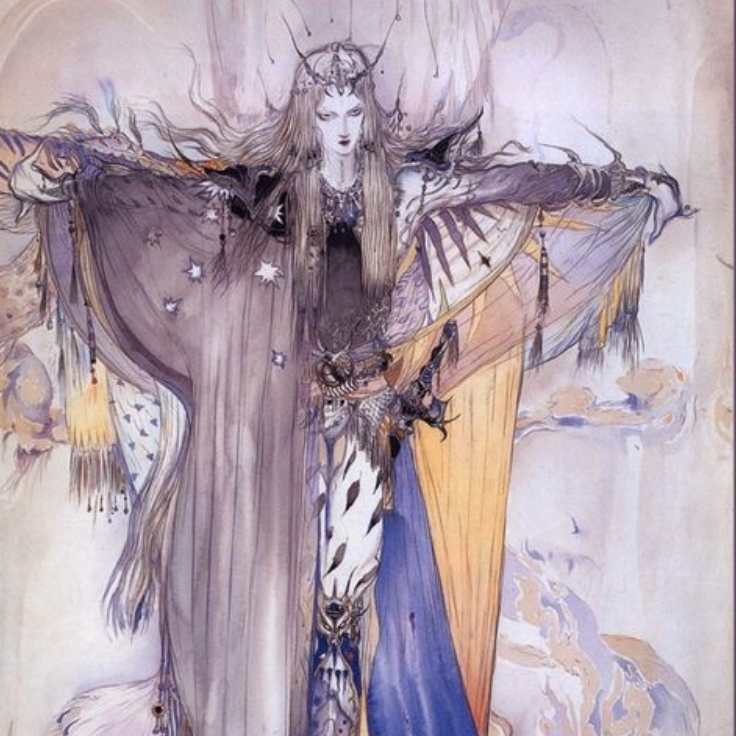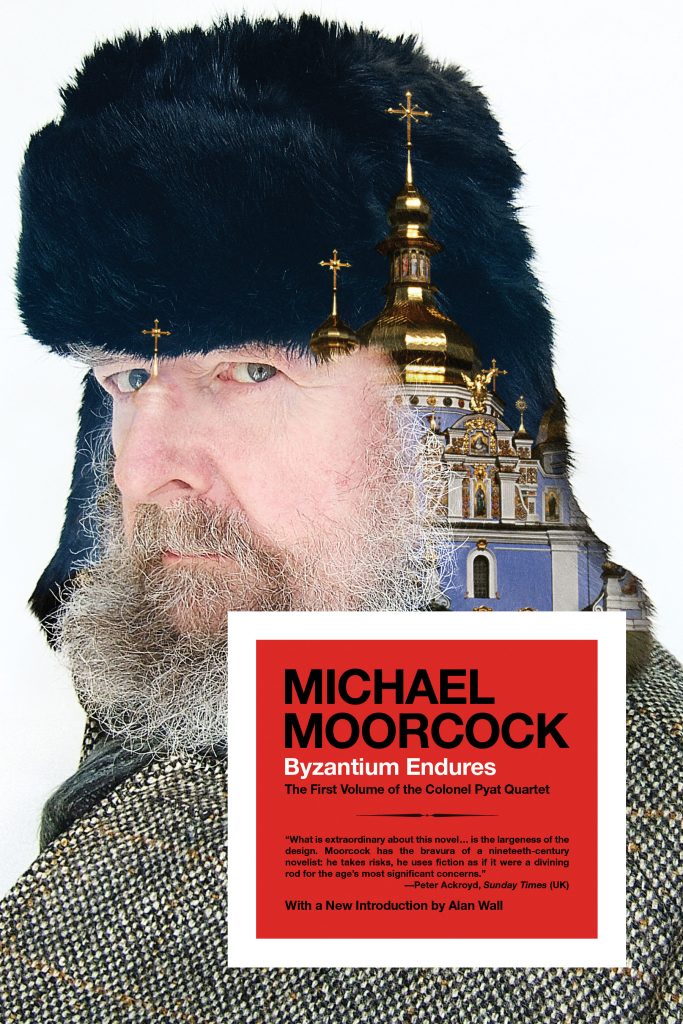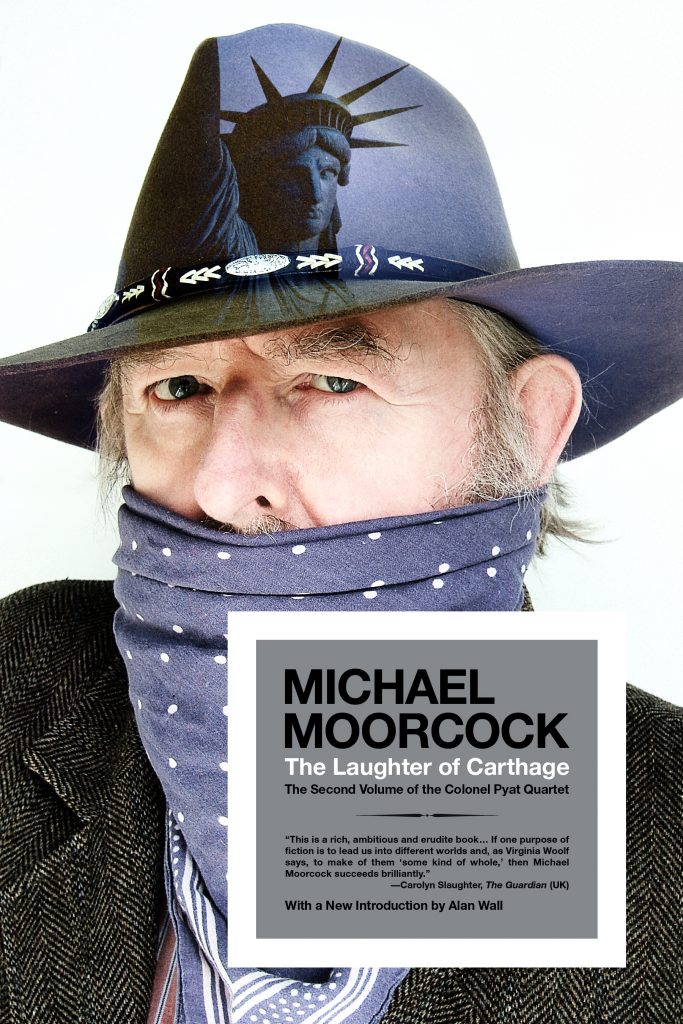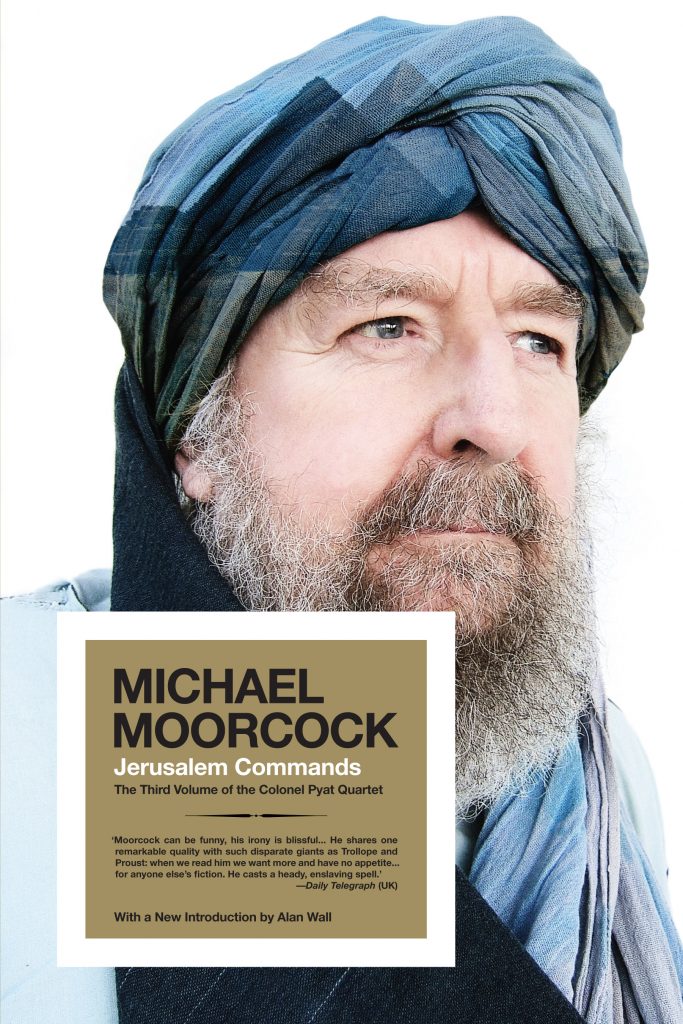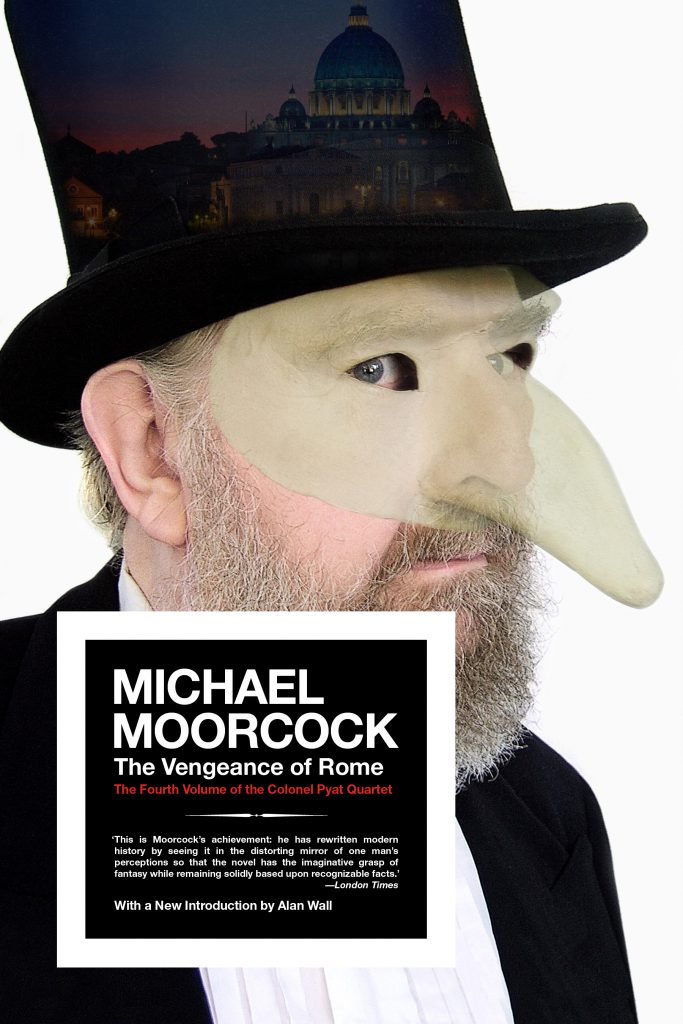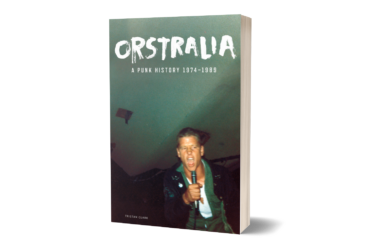By Derek Garcia
Screenrant
November 22nd, 2021
Screen Rant spoke with legendary fantasy author Michael Moorcock, whose Elric stories are being adapted as a videogame, about his inspiring legacy.
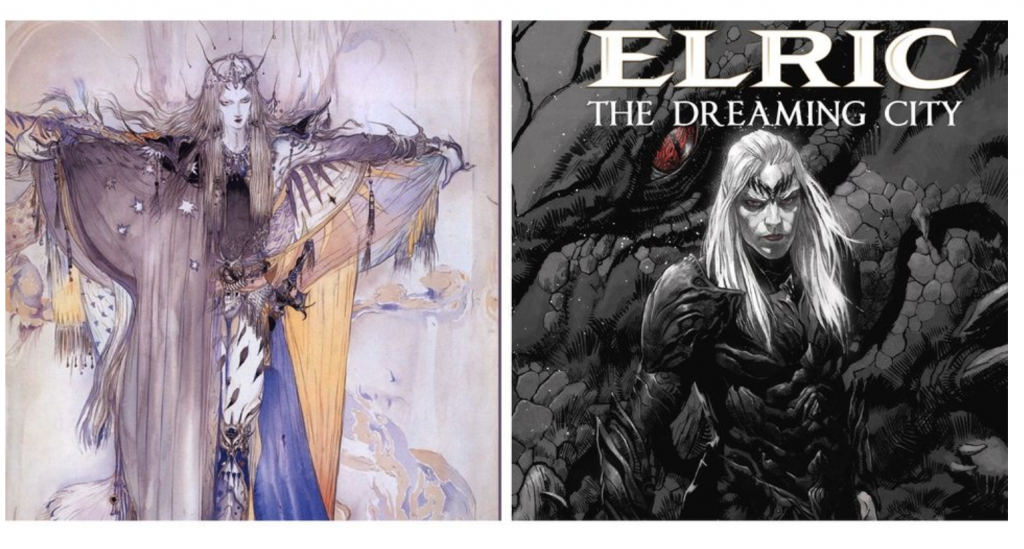
Michael Moorcock is among the most influential fantasy authors, whose work has impacted decades of genre fiction and gaming alike. His most well-known character, Elric of Melnibone, marks his 60th anniversary with the announcement of a video game adaptation of the character’s original stories. The video game, also titled Elric of Melnibone, is described as a “narrative action” game, and it is being made by Swedish IP developer Runatyr, in conjunction with Aurora Punks and Upstream Arcade (West of Dead). The game is planned to cover the original six novels in the Elric saga, and the developers are aiming for a 2024 release on consoles and PC.
Elric is a distinctive character in fantasy, an anti-hero who is an albino and a sorcerer, born the heir to a decadent and evil empire. The character made pacts with elementals and Chaos Lords and wielded the signature weapon Stormbringer, an evil, sentient, soul-drinking sword. Elric’s adventures were leagues away from the archetypal heroic fantasy of Tolkien, and the character was the anthesis of straightforward Sword and Sorcery protagonists like Conan. The character often became embroiled in the struggle between the forces of Law and Chaos, and several Elric stories involved crossing into the multiverse of Moorcock’s fiction, where Elric served as an incarnation of the Eternal Champion.
Related: D&D Alignment Charts Should Be Used For NPCs Too
The Elric character has inspired artwork from iconic Final Fantasy artist Yoshitaka Amano, and Moorcock’s rendition of the clash between Law and Chaos helped form Dungeons & Dragons’ original alignment concept. He is also credited with coining the term “multiverse,” a notion which is currently showcased by both Marvel and DC-adapted superhero films and seen in works as diverse as Stephen King’s Dark Tower series and D&D’s concept of planar travel. Michael Moorcock spoke with Screen Rant and discussed Elric’s history, the new Elric of Melnibone game, his own literary inspirations, and the evolution of the fantasy genre.
Elric of Melnibone has been an iconic fantasy character for decades, and there have been rumors in the past of plans for videogame and film adaptations of the character’s stories. Several comic book adaptations and original stories involving Elric, the Multiverse, and the Eternal Champion have been published, but the stories haven’t made the jump to games or films. What allowed this video game project, with this development team, to get traction where others stalled out?
Michael Moorcock: The problem that we were having in the early days is that for Elric it was too soon, if you know what I mean… The technology didn’t really exist to make it into a decent game. So, in the early versions, although the visuals themselves were good, often very good, getting (it developed into) an actual video game seemed to defeat people… There are certain standards, Elric is simply not an easy character for a game, that’s for sure. What he does needs to be reflected in the very basis of the gameplay, the frequent moral choices that have to be made, and the simpler choices. Whether they’re very simple choices, or fairly complex choices. So, I think that it’s really a question of technology, and what exists now to make something really work… The (Elric-based tabletop RPG) board games have been popular for years, but you know, it’s not so easy with a video game… I remember the first (Elric tabletop RPG) board game somebody brought me to show me and see what I thought of it. And I was just baffled at the end of it. It was so complicated. I don’t think anybody could have played it, except this one guy. I mean, it just went on and on… We’ve gotten a lot more sophisticated, too, you know, we’ve just developed a lot of knowledge (on adaptations), we know how to do things. So that’s it.
Are there any other multimedia adaptations of Elric, or your other works, still going forward? A lot of fans would love to see a film or television series adapting Elric, Hawkmoon, Corum, any of these classic fantasy series.
Michael Moorcock: We pulled the last film… They were just getting more and more away from the original idea. It was becoming this problem where the genre itself can stifle what started the genre. It’s very strange… You miss the subtleties of palette. People miss the mood and style of something. They just go for the action and the adventure. And if that’s all it is, anyone can put a couple of characters together and make them fight with swords or whatever… Each of the writers who were influential in fantasy, not necessarily to me, but in fantasy in general, did more… (Robert E.) Howard produced Conan, Tolkien produced all those elves and stuff. I’m not a great elf fan. I’m one of those people at the old the old pub who used to try and get tell him to shut up about his bloody elves, but nonetheless, you cannot deny his vast influence. And so these writers were all writing independently, but they read and wrote fantasy… The sense of it being a genre came fairly late in its existence… I wanted to call it Heroic Fantasy, which seemed to me to be pretty inclusive. Fritz (Lieber) made the joke at the time, there were a lot of Italian (fantasy) movies around, you know, Hercules versus the whatever. And they were called Sword and Toga pictures. So, a lot of (early fantasy) was called Sword and Sorcery. And name stuck. I actually preferred Heroic Fantasy because it was a little more inclusive.
Screen Rant: So you, and some of the formative figures, were just writing your own works. You weren’t trying to adhere to genre conventions, because there wasn’t really a genre to adhere to yet.
Michael Moorcock: Yeah, when I first started writing it, nobody knew what to call it at all. I mean, the publishers didn’t know what to call it. They thought that Tolkien was (writing about) a post-apocalyptic nuclear world. That’s the only way they could perceive an alternate world, in other words. And it was the same with Mervyn Peake… they’re all interpreted that way. The idea of putting ‘fantasy’ on a book meant usually meant that it was a children’s book. And if you put fantasy as the genre, they usually put ‘SF’ larger than ‘fantasy’ to show that it was what it was. So really, there really was nothing like an adult fantasy genre… Today’s experience is just totally different.
Screen Rant: Elric was, and remains, very different from the typical protagonist in a fantasy novel. He was kind of the antithesis of Conan the barbarian, or a typical heroic knight, being sickly, a sorcerer, and part of a decadent empire that was crumbling, and prone to very sudden emotional reactions. The aesthetics of the character are obviously striking, and imagery of a gaunt albino who makes pacts with elementals, bargains with Lords of Chaos, and rides dragons, wielding a sentient soul-drinking sword, is still as compelling as ever. What would you credit for the lasting popularity of Elric, and his status as a “signature character” for the majority of your readership, instead of Corum, Hawkmoon, or Jerry Cornelius?
Michael Moorcock: Elric was me, I mean, he was me as a sort of an angsty late adolescence, where you have all the problems of an adolescent rather exaggerated, but nonetheless, they were basically the same problems. Who am I, you know, should I be listening to this person? Should I be trying to follow my own path? What my inner voice says to me, you know, do I even have an inner voice to have any kind of judgment? …All this is roiling about inside you. And you know, when you’re 18 or 19, you can’t help but ask these questions. I was a working journalist when I wrote the first story, and I was simply commissioned to write for a magazine. I was writing science fiction and fantasy, of course, not for commission (at that time). I was talking to the editor in a pub, the editor suggested, hey, wouldn’t it be nice to have (a fantasy style story)? …I already had an idea in my head. I decided, once we sort of talked about it, I might as well give this my best shot… I’d been talking about Elric a bit to the illustrator, and he’d been drawing Elric and so I had him sort of ready. …From a very early age, I’d been interested in mythology. I liked Romance, like the Arthurian Romances, and that sort of thing, folktales of many, many kinds. …I read a lot of gothic fiction because I was really curious about the origins of what I’d been reading. From Weird Tales, for instance. …There was that big fantasy genre of the mid-19th century. I mean, they had women swooning, you know, all the usual stuff, but they’re exactly like the fantasies are in any period that has a lot of social change. People tend to symbolize their frustrations and their fears in terms of fantasy, because the reality is too complicated too often. …Not one of us a supercomputer able to absorb all this vast amount of information which comes into us every day. …I’m very contemptuous of escapism, if you’ve ever read any of my criticism, I don’t believe that that fiction or fantasy has to be escapist. It can be that you can have social justice. Sherlock Holmes is both, I mean, it dealt with a lot of the issues of the day. In the stories, you can give people a good time, but you don’t have to necessarily give them a shallow time. …If the reader comes back to find something fresh, you know, after they’ve read it a second or third time, then you’ve done a pretty good job. …I’ve often recommended people read deeper into the genre, because if you go back to the beginnings, you’re also going back to the vitality that was there, and you feel it. It doesn’t matter. It can be horribly written. But there’s something there where the person has actually had a vision, they’ve seen something, and they’ve got excited about it. And that excitement is what you always get at the beginning of a genre where people are excited about the images, the ideas, coming out of their heads and banging them out on paper. I used a manual typewriter, sometimes 200 words a minute and three days a book. The ideas had to get out.
Screen Rant: Your novels are obviously a huge influence on fantasy literature, but they’ve also had a major impact on the gaming world. Elric and Hawkmoon have had tabletop RPG adaptations, and Dungeons & Dragons itself owes a lot to your work, as the struggle between Law and Chaos that carried over throughout many of your novels is considered the inspiration for D&D’s “alignment system.” It’s a far-reaching influence, as Japanese videogame RPG series like Shin Megami Tensei also keep the Law vs Chaos struggle as a central theme. Final Fantasy illustrator Yoshitaka Amano did a number of illustrations of Elric. Have you tracked the influence of your work on gaming – tabletop role playing games and videogames alike, and did you ever expect your stories to lend themselves to that creative space?
Michael Moorcock: I never would have expected it, because of course, it didn’t exist at the time. …I do like gaming, I like gamers. I like the whole notion of gaming. I don’t game myself. A friend of mine who does a lot of sword and sorcery stuff, among other things, nice guy… he started gaming pretty early on, he got very excited about role-playing games. And he stopped writing (fantasy). Because in a sense, the game satisfied his creative need for fantasy, storytelling, whatever it was. And, although I don’t think that would happen to me, I don’t have time. …There’s very little (modern) fantasy that I find stimulating, interesting. I mean, I’ve just got this balmy brain, I have to kind of restrain it, because the stuff just sort of pours out all the time. A lady friend of mine once said, I had an ‘unsleeping mind,’ and I think I bloody do, and I’m sorry about it, too. I don’t particularly like it, I’d like to have a more sleeping mind. …I’m writing almost constantly. There are ideas there all the time, and images and language and so on. It’s just what I do. I don’t have a need for anything else. It’s not like I reject the idea of games at all. I love the idea, again, they can socialize people. I think they increase sociability, flexibility of mind, all sorts of stuff. As well as being fun to do. …I mean, I threw myself and my material into D&D as soon as it came up. I didn’t charge them a penny. I thought we were all in it together, if you know what I mean. We were all in it together at that point. Corporations came in as the thing became popular. It’s us who made the corporations, unfortunately, because enough of this (became) popular to make money for corporations.
Screen Rant: What are your thoughts on these creators and authors’ use of the struggle between Chaos and Law in fiction?
Michael Moorcock: I myself got that from Poul Anderson. That is to say, I wasn’t the first to think of it. Anderson got it from Milton, I suppose. But as far as the idea formalized, given that shape and all, I suppose I did do that. But it was Paul, who’s first. His novels were a huge influence on me. The Broken Sword and Three Hearts and Three Lions, which wasn’t as good it didn’t have the same drive. This was very early Anderson. …Anyway, that’s where, and I didn’t like the idea of good and evil, I thought that whole thing was childish. It was absolutely childish. No one can honestly determine what is good and what is evil because context determines everything. … I think good evil as absolutes leans towards religion, the sort of religion that is mostly about people’s prejudices. It’s no longer about the spiritual core of what it means. I’m a great respecter of religion, but not of the religious or religiosity. And religiosity is what dominates this country at the moment. …It’s pseudo religion. Right? And it’s horrible. But anyway, that moved me away from good and evil. (Law and chaos) aren’t a substitute. I have good people, people doing what we would call good, for chaos, and (stories where) law is evil. Morality is still important, and context.
Screen Rant: Beyond the world of gaming, the notion of a fictional “multiverse” is huge in pop culture right now. You are credited as coining the term “multiverse,” and your body of work established the notion of the “Michael Moorcock” multiverse clearly, with the battle between Law and Chaos having rippling effects up and down the planes of existence in the Eternal Champion cycle, the Second Ether trilogy, and others. American comic books would later follow suit and run with the multiverse idea, and we are seeing a lot of those multiverse concepts adapted to the big screen now, from Marvel and DC comics, while other authors like Steven King later also followed suit and created their own “literary multiverses.”
Michael Moorcock: It is amazing. Yeah, took it took them 20 years, I mean, I thought they’d have been a little faster on it. To be fair, DC asked me to write, I don’t know, sort of a background to a kind of multiverse for them very early on and they paid me for it. Not a glossary, you know, a description of the multiverse. They wanted to be able to rationalize their magic characters like Captain Marvel, the old Captain Marvel, Shazam, and science characters, the Superman from another planet rationale. And so, I gave them this structure, which was basically the same structure that I’ve used since I was 20. Of how I saw the multiverse, or rather, how I saw the whole thing as rational, so that you could actually have both things going on at the same time if you want to. I think it was too complicated for them because they got … another version, which I think was probably simpler. …My multiverse wasn’t a fictional multiverse as such, it was a scientific guide to a metaphysical idea derived from physics. H.G. Wells did the alternate universe idea he came up with that in the 19th century. … But until Wells, nobody had done anything close to that in fiction, rationalized, seen as a scientific thing, the same with plenty of time travel stories before Wells. But Wells showed time, and how it could be harnessed, or at least how you could exist and travel within it. And how it could be seen as a fourth dimension and understood so there was logic in it, there was scientific logic. …That was the same with the multiverse. …That we started with a bang, the Big Bang, and that we were expanding constantly, that entropy is our end, as it were, and eventually the universe would die. At least the universe as we know it would die. I think that I and various scientists came up with the same idea as an intellectual, no, a gut response to the Big Bang Theory. Multiverse theory allows you lots of lots of universes. So you don’t actually ever lose the universe. You don’t lose memory, which is one of the things that people are afraid of. It’s in our instincts, it’s in our DNA. We can’t afford to lose memory. …Also, I am an existentialist. I mean, I do believe we are on the brink of the abyss. No, not tomorrow, and I don’t mean in 20 years’ time, but I do believe that we eventually will disappear. And probably our memories will disappear with us, which is fine, because we don’t need them anymore. …We’re just curious animals, it’s in everything, everything we do is just this animal that that happens, by some aberration, to have that kind of curiosity, a grade greater than any other animal. We investigate more than any animal can and make ourselves tools, etc., etc. It’s a very strange little creature really, mankind. Anyway, my point about the multiverse is that it is a metaphysical response, not a physical response. I made it up as a physical thing, as a response to metaphysical concerns.
Screen Rant: Beyond multiverses and an alignment conflict between Law and Chaos, there are so many elements of your work that inspire subsequent fiction. Evil sentient swords abound, the crumbling empire of Melnibone, complete with its dragon riders and incestuous tendencies, is mirrored in a lot of fiction, including A Song of Ice and Fire’s Targaryens, demonic figures resembling Arioch appear frequently in fantasy, etc. When reading modern fantasy, or watching films or television, how often are you able to say, “That was probably inspired by my work”?
Michael Moorcock: Really, it gets too frustrating. They’re not using it right most of the time. It’s just a superficial pinch. It was like, the Bastable books (The Warlord Of Air series), which people see as being early steampunk or something like that. Of course they weren’t, but everybody went on about the airships, which is fair enough, I suppose. It’s probably my own fault. …So I shouldn’t really complain. …I haven’t seen a Game of Thrones. I like the look of the dragons… and I love dragons. I love dragon movies, I’ll watch any movie with a dragon in it. People say a lot of things (remind them of my work). People keep telling me these things. They say, did you know that sounds like you? I don’t have time for most of it.
Screen Rant: Are you working on any novels or short stories at the moment that you’d care to discuss, or any non-fiction works? Are you writing a follow up to The Whispering Swarm, or anything else readers can look forward to?
Michael Moorcock: Yeah, I’ve done the sequel to The Whispering Swarm. …I’ve got three new (editions of) Elric books coming up from saga at the beginning of next year, these are illustrated classics, the Canon. Then there’s a new Elric novel which is which is due out at the end of this year. After that, at the end of the following year, Kaboul should be coming out this year. That’s a sequence of stories I wrote (in a French-language illustrated edition). …The new Elric novel is The Citadel Of Forgotten Myths. …It is a bit pulpy, but I like it.
Screen Rant: You mentioned earlier, when you originally wrote Elric, you were obviously at a very different time in your life and he embodied that angsty, adolescent, coming of age time. How challenging is it to write that character now, at a different point in your life?
Michael Moorcock: I was an angry young man, right? Now I’m an angry old man. So, the difference is I’ve got a little bit more wisdom. I identify with Elric, but I’m never going to be him. I’ve never been upset about him. You know, people say you must get sick of hearing about Elric all the time. I don’t, Elric is my living, my bread and butter, and his stories have given a lot of pleasure to people, so I’m just grateful to the world and the character. It is difficult, because you start with adolescence, and an adolescent character, and you’ve somehow got to show him maturing. Also because he dies pretty early (in the saga). Something of an old spoiler. But, you know, he’s still with me, so I remember (Elric) getting the old juices flowing, still. I’m a little bit more long-winded, now, I think that old men get like that. This is not one long winded pastime epic you can hammer out in a day anymore.

